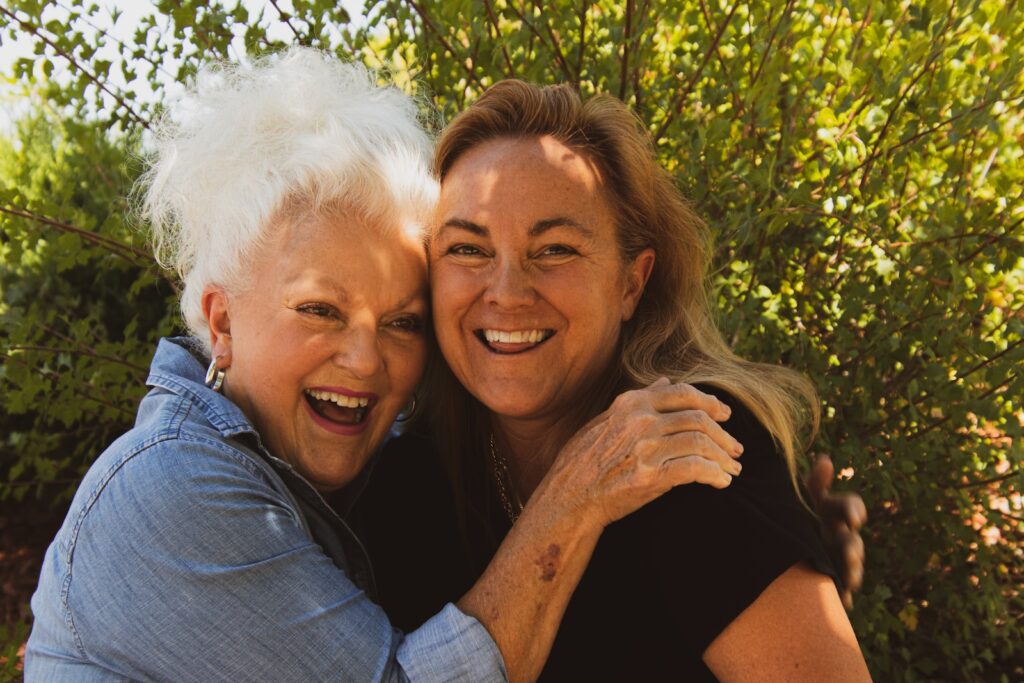
Aging Gracefully: Senior Health and Wellness Tips
Here Are Ten Senior Health and Wellness Tips
Tip 1. Maintain Regular Physical Activity:
- Exercise Regularly: Aim for at least 150 minutes of moderate aerobic weekly exercise. This can include walking, swimming, or cycling. Use strength training exercises twice weekly to maintain muscle mass and bone density.
- Stay Flexible: Engage in flexibility exercises like stretching or yoga to maintain mobility and reduce the risk of falls.
Tip 2. Adopt a Balanced Diet:
- Nutrient-rich foods: Focus on a diet rich in fruits, vegetables, whole grains, lean proteins, and healthy fats. These provide essential nutrients and help maintain a healthy weight.
- Stay Hydrated: Ensure adequate fluid intake, as the sense of thirst can diminish with age.
- Moderate Portions: Pay attention to portion sizes to avoid overeating.
Tip 3. Prioritize Mental Health:
- Stay Mentally Active: Engage in activities that challenge your brain, like puzzles, reading, or learning new skills.
- Mindfulness and Relaxation: Meditation, deep breathing, or tai chi can reduce stress and improve mental well-being.
Tip 4. Regular Health Check-ups:
- Routine Screenings: Stay up-to-date with regular health screenings and vaccinations. This includes blood pressure checks, cholesterol levels, diabetes screening, and cancer screenings.
- Medication Management: Regularly review your medications with your healthcare provider to ensure they are still necessary and adequately dosed.
Tip 5. Social Engagement:
- Stay Connected: Maintain a robust social network. Regular interaction with friends, family, and community groups can reduce loneliness and boost mood.
- Volunteer or Join Clubs: Engaging in volunteer work or joining clubs can provide a sense of purpose and community involvement.
Tip 6. Quality Sleep:
- Regular Sleep Schedule: Maintain a consistent sleep schedule. Ensure your bedroom is comfortable for sleeping – dark, quiet, and relaxed.
- Limit Stimulants: Avoid caffeine and heavy meals close to bedtime.
Tip 7. Fall Prevention:
- Safe Home Environment: Ensure your living space is free of fall hazards like loose rugs or poor lighting. Consider installing grab bars in the bathroom.
- Balance Exercises: Engage in exercises that improve balance and coordination.
Tip 8. Stay Positive:
- Positive Outlook: A positive attitude can improve overall health and longevity. Focus on gratitude and the enjoyable aspects of life.
Tip 9. Hobbies and Interests:
- Pursue Hobbies: Engage in activities you enjoy. This could be gardening, painting, cooking, or anything that brings you joy.
Tip 10. Listen to Your Body:
- Be Aware of Changes: Pay attention to any physical or mental changes and discuss them with your healthcare provider.
Aging gracefully is about accepting the aging process with a positive attitude toward health and well-being. It’s about caring for your body and mind and enjoying life. Remember, it’s never too late to adopt healthy habits that can make a big difference.

The Science Behind Aging
Aging is a natural and inevitable part of life, a journey that we embark on from the moment we are born. It’s a process that carries changes, challenges, and opportunities. Understanding aging is crucial to embracing our later years with grace, dignity, and positivity.
Aging is not just about the number of candles on your birthday cake; it’s a complex biological process. As we age, our bodies undergo various physiological changes. Cells begin to function less efficiently, and the body’s ability to repair itself diminishes. Genetics, lifestyle choices, and environmental factors influence this natural progression.
Cellular Aging
At the cellular level, aging is marked by the shortening of telomeres, the protective caps at the ends of our chromosomes. Each time a cell divides, these telomeres become slightly shorter until they reach a point where they can no longer protect the chromosomes, leading to cell aging and, eventually, cell death.
Hormonal Changes
Hormones play a significant role in aging. For instance, as we age, hormones like estrogen and testosterone decrease, impacting everything from bone density to mood regulation. These hormonal changes are a natural part of aging and contribute to some of the most noticeable signs of aging.
Metabolic Changes
Our metabolism also slows down with age, making the body less efficient at converting food into energy. This change can affect body weight and energy levels and can increase the risk of conditions like type 2 diabetes and heart disease.
The Impact of Aging on Health and Lifestyle
Aging affects our physical health, lifestyle, and mental well-being. Recognizing these changes and adapting our lifestyles to maintain health and happiness is essential.
Physical Health
Common physical signs of aging include decreased muscle mass and strength, reduced bone density, and changes in cardiovascular health. These changes can affect mobility and increase the risk of injuries and illnesses. However, many of these risks can be mitigated with regular exercise, a balanced diet, and chronic health check-ups.
Mental Health
Mental health is equally important. Aging can bring challenges such as memory decline and a slower cognitive processing speed. Engaging in mentally stimulating activities, socializing, and maintaining a sense of purpose are vital for mental health as we age.
Social and Emotional Well-being
As we age, our social networks may change. Retirement, the loss of loved ones, and physical limitations can lead to feelings of loneliness or isolation. It’s important to seek out social interactions through community activities, hobbies, or spending time with family and friends.
Embracing Aging with Positivity
Aging is an inevitable part of life, but it doesn’t have to be a negative experience. Understanding the aging process and adapting our lifestyles allows us to age gracefully and enjoy our golden years.
A Positive Outlook
Maintaining a positive outlook is key. Embracing the wisdom, experience, and maturity that come with age can lead to a fulfilling and enriching life.
Staying Active and Engaged
Staying physically active, engaging in hobbies, and learning and growing are essential for a healthy aging process. These activities keep the body and mind sharp and provide a sense of joy and fulfillment.
Building Strong Relationships
Strong social connections are crucial for emotional well-being. Building relationships with family, friends, and the community can provide support, companionship, and a sense of belonging.
In conclusion, aging is a natural process that brings its own set of challenges and rewards. Understanding and embracing these changes can make our later years some of the most rewarding of our lives. Remember, aging is not just about growing older; it’s about increasing wiser and finding new ways to enjoy and celebrate life.
Key Takeaways
- Aging is a natural process that gradually declines physical, mental, and emotional capabilities.
- Adopting healthy lifestyle habits can slow aging and maintain a high quality of life as you age.
- Nutritional strategies, physical activity, mental health, and preventative healthcare measures are essential for senior health and wellness.
As we age, our bodies undergo various changes that can impact our physical, emotional, and mental health. Aging gracefully means embracing these changes while maintaining overall health and wellness. This article will explore senior health and wellness tips to help you enjoy a fulfilling and active lifestyle.

Aging is a natural and inevitable process that affects everyone. It is a complex process that involves both biological and psychological factors. However, you can slow the aging process with the right strategies and lifestyle choices. Understanding the aging process can help you to age gracefully and maintain good health and wellness.

Understanding the Aging Gracefully Process
Biological Factors of Aging
Biological aging factors include changes in the body’s cells, tissues, and organs. As you age, your body’s cells become less efficient at repairing damage, and this can lead to the development of diseases such as cancer, heart disease, and Alzheimer’s disease.
The aging process can also change the body’s tissues and organs. For example, your skin becomes less elastic, and wrinkles may develop. Your bones may become weaker, and you may be at a higher risk of developing osteoporosis. Your eyesight may also decline, and you may be at a higher risk of developing cataracts and macular degeneration.
Psychological Aspects of Aging
Psychological aspects of aging include changes in your mental health and well-being. As you age, you may experience changes in your mood, memory, and cognitive function. You may also be at a higher risk of developing depression and anxiety.
It is essential to maintain good mental health and well-being as you age. This can involve staying socially active, engaging in activities that you enjoy, and seeking help if you are experiencing mental health problems.
You can enjoy a happy and fulfilling life as you age by taking care of your physical and mental health.

Nutritional Strategies for Healthy Aging
As you age, your body’s nutritional needs change. A balanced diet is essential for healthy aging. This section will explore the importance of a balanced diet, recommended foods for seniors, and the benefits of consulting a nutritionist.
Importance of a Balanced Diet
A balanced diet is crucial for healthy aging. It provides your body with the nutrients it needs to function correctly. A balanced diet includes a variety of foods from all food groups, including vegetables, fruits, whole grains, and lean protein. It also limits the intake of processed foods, saturated fats, and sugars.
Recommended Foods for Seniors
Your body may require fewer calories as you age, but it still needs the same amount of nutrients. Seniors should consume plenty of fruits and vegetables, which are rich in vitamins and minerals. Whole grains provide fiber, which helps with digestion and can reduce the risk of heart disease. Lean protein sources such as fish, poultry, and beans are also essential for seniors.
Consulting a Nutritionist
Consulting a nutritionist can be beneficial for seniors. A nutritionist can help you create a personalized meal plan that meets your nutritional needs. They can also guide portion control and help you make healthy dining choices. If you have a medical condition or take medication, a nutritionist can help you manage your diet to avoid adverse effects.
A balanced diet is crucial for healthy aging. Seniors should consume plenty of fruits, vegetables, whole grains, and lean protein while limiting their intake of processed foods, saturated fats, and sugars. Consulting a nutritionist can also be beneficial for seniors to create a personalized meal plan that meets their unique nutritional needs.
Physical Activity and Exercise

As a senior, physical activity and exercise are essential for maintaining good health and wellness. Regular exercise can help you maintain strength, flexibility, and balance, which is crucial for preventing falls and injuries. It can also help you manage chronic conditions such as arthritis, heart disease, and diabetes.
Benefits of Regular Exercise
Regular exercise has numerous benefits for seniors. It can help improve cardiovascular health, strengthen bones and muscles, and enhance overall well-being. Exercise can also boost mood, reduce stress and anxiety, and improve cognitive function.
Exercise Options for Seniors
Many exercise options are available for seniors, including walking, swimming, yoga, and strength training. Walking is a great, low-impact exercise that can be done almost anywhere, while swimming is an excellent option for those with joint pain or mobility issues. Yoga can help improve flexibility and balance, while strength training can help build muscle mass and improve bone density.
Maintaining Flexibility and Balance
Maintaining flexibility and balance is crucial for seniors, as it can help prevent falls and injuries. Stretching exercises such as yoga and Pilates can help improve flexibility, while balance exercises such as standing on one foot or walking heel-to-toe can help improve balance. Incorporating both types of exercises into your routine is essential to maintain your overall physical health.
Regular physical activity and exercise are essential for seniors to maintain good health and wellness. Incorporating various exercises into your routine can improve your cardiovascular health, strengthen your bones and muscles, and enhance your overall well-being. Remember to consult your doctor before starting any new exercise program, and slowly and gradually increase your activity level.
Mental Health and Emotional Well-Being
As you age, it is essential to prioritize your mental health and emotional well-being. Here are some tips to help you maintain your mental health and emotional well-being:
Coping with Stress and Depression
Stress and depression can be expected in seniors, but it’s essential to recognize the symptoms and seek help when needed. Some ways to cope with stress and depression include:
- Talking to a trusted friend or family member
- Joining a support group or club
- Participating in events or activities that you enjoy
- Practicing deep breathing or mindfulness techniques
The Role of Social Engagement
Social engagement is vital for seniors’ mental health and emotional well-being. It can help combat feelings of loneliness and isolation and improve overall mood. Here are some ways to stay socially engaged:
- Join a volunteer program in your community, where you can interact with others while giving back to your community. 1
- Join a club or organization that interests you, such as a book club or gardening club.
- Attend events or activities in your community, such as concerts or art exhibits.
Mindfulness and Relaxation Techniques
Practicing mindfulness and relaxation techniques can help reduce stress and improve overall well-being. Here are some methods to try:
- Deep breathing exercises
- Progressive muscle relaxation
- Meditation or yoga
Prioritizing your mental health and emotional well-being is crucial as you age. By coping with stress and depression, staying socially engaged, and practicing mindfulness and relaxation techniques, you can improve your overall well-being and enjoy your golden years.
Footnotes
Healthcare and Preventative Measures
As you age, it is essential to take care of your health by taking preventative measures and scheduling regular health screenings with your healthcare provider.
Regular Health Screenings
Regular health screenings are an essential part of maintaining good health. Seniors should get a physical exam, eye exam, and dental check-up regularly. These check-ups can help catch chronic illnesses such as diabetes, high blood pressure, and cholesterol before they become a problem. It is essential to discuss any concerns or symptoms with your healthcare provider during these check-ups.
Managing Chronic Conditions
Chronic conditions such as diabetes and high blood pressure can be managed through proper diet, exercise, and medication. It is essential to follow your healthcare provider’s instructions and take any prescribed medication as directed. Keeping a record of your blood sugar levels or blood pressure readings can help you and your healthcare provider monitor your condition.
Staying Hydrated
Drinking enough water is essential for overall health and can help prevent dehydration, which can be a severe health concern for seniors. It is recommended that seniors drink at least eight glasses of water per day. If you have trouble drinking enough water, add flavor with a slice of lemon or lime.
You can maintain good health as you age by taking preventative measures, scheduling regular health screenings, and managing chronic conditions. Remember to discuss any concerns or symptoms with your healthcare provider and follow their instructions for managing your health.
Sleep and Recovery
As you age, it’s essential to establish a healthy sleep routine to ensure you get the rest you need. Getting enough sleep is crucial for your overall health and well-being. This section will discuss establishing a healthy sleep routine and the importance of quality sleep.
Establishing a Healthy Sleep Routine
Establishing a healthy sleep routine can help you sleep better and improve your sleep quality. Here are some tips to help you select a healthy sleep routine:
- Stick to a consistent sleep schedule: Try to go to bed and wake up at the same time every day, even on weekends.
- Create a relaxing bedtime routine: Take a warm bath, read a book, or listen to soothing music before bed to help you relax and unwind.
- Limit your exposure to electronics: The blue light emitted by electronic devices can interfere with sleep. Try to avoid using electronics for at least an hour before bed.
- Create a comfortable sleep environment: Ensure your bedroom is calm, quiet, and dark. Use comfortable bedding and pillows to help you sleep better.
The Importance of Quality Sleep
Getting enough quality sleep is essential for your overall health and well-being. Quality sleep can help you:
- Improve your memory and concentration: Sleep helps consolidate memories and improve cognitive function.
- Boost your mood: Lack of sleep can lead to irritability, mood swings, and even depression.
- Promote healing and recovery: Sleep is essential for tissue repair, muscle growth, and overall recovery.
- Reduce your risk of chronic diseases: Lack of sleep has been linked to an increased risk of obesity, diabetes, heart disease, and other chronic conditions.
You can improve your overall health and well-being by establishing a healthy sleep routine and getting enough quality sleep.
Conclusion
In conclusion, aging gracefully means taking care of your physical, emotional, and mental health while embracing the natural changes that come with aging. Following the tips in this article, you can maintain good health and enjoy your golden years.
Remember to prioritize your health by eating a balanced diet, staying active, and getting enough sleep. It’s also essential to keep up with regular check-ups and screenings with your healthcare provider.
In addition, don’t forget to nurture your emotional and mental well-being by staying connected with loved ones, pursuing hobbies and interests, and practicing relaxation techniques such as meditation or yoga.
By holistically caring for yourself, you can age gracefully and enjoy a fulfilling and healthy life.
Frequently Asked Questions
What are the best daily habits to promote senior health and wellness?
The best daily habits to promote senior health and wellness include getting enough sleep, staying hydrated, eating a balanced diet, and engaging in regular physical activity. Additionally, avoiding smoking and limiting alcohol consumption can also contribute to overall health.
Which dietary choices can support graceful aging and overall well-being in seniors?
A healthy diet for seniors should include plenty of fruits, vegetables, whole grains, lean proteins, and healthy fats. Additionally, seniors should limit their intake of processed foods, sugary drinks, and foods high in saturated and trans fats.
How does physical activity contribute to aging and maintaining health in later years?
Physical activity can help seniors maintain strength, flexibility, and balance, reducing the risk of falls and other injuries. Exercise can also help manage chronic conditions such as arthritis, heart disease, and diabetes. Regular physical activity can also improve mood and cognitive function.
What role does mental health play in the process of aging gracefully?
Mental health is an essential component of aging gracefully. Seniors should aim to maintain social connections, engage in activities that bring them joy, and seek help if they are experiencing symptoms of depression or anxiety. Practices such as meditation and mindfulness can also promote mental well-being.
Can you provide strategies for managing stress to enhance aging gracefully?
Strategies for managing stress include practicing relaxation techniques such as deep breathing, meditation, or yoga. Engaging in physical activity, spending time in nature, and seeking social support can also help manage stress. It is also important to prioritize self-care and take time for enjoyable activities.
How critical is social engagement for seniors looking to maintain their health and age gracefully?
Social engagement is critical for seniors looking to maintain their health and age gracefully. Social connections can help combat loneliness and depression and provide a sense of purpose and belonging. Seniors should aim to stay connected with family and friends, join social groups or clubs, and volunteer in their community.
Share via:

